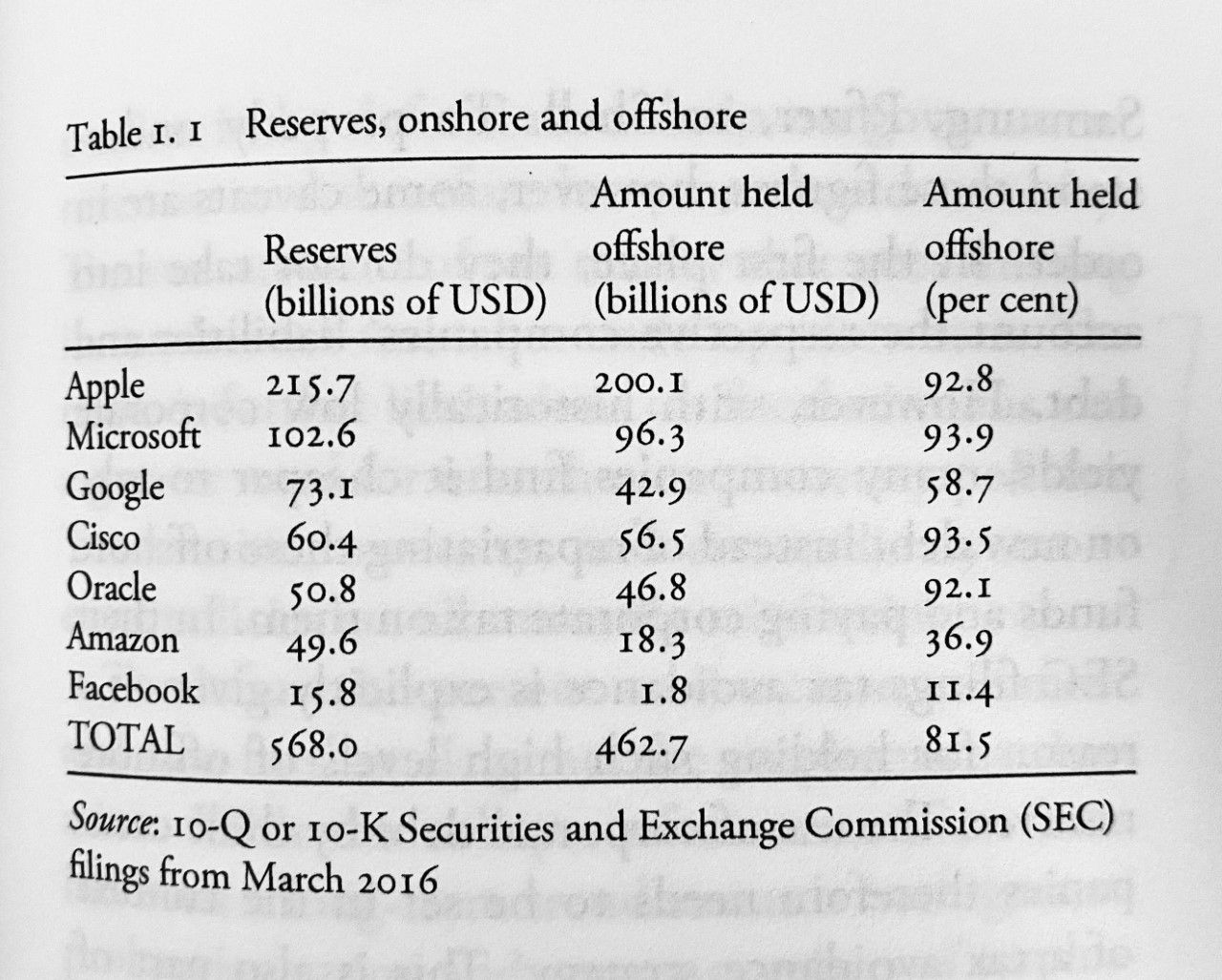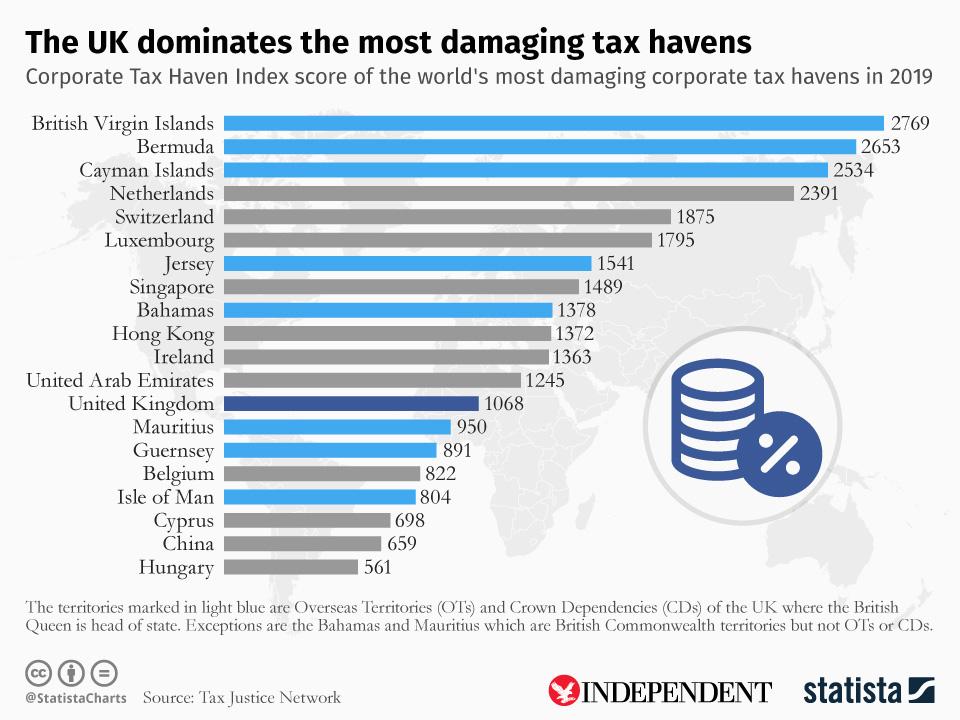The Fall of the British Empire –
‘At the twilight of the British Empire, bankers, lawyers and accountants from the City of London set up a spiders web of offshore secrecy jurisdictions (power to make legal decisions) that captured wealth from across the globe and funnelled it to London.’
Britain’s transformation from a colonial power to a modern financial power, was due to the empires collapse, and its multiple colonies claiming their independence. This lead to many ‘British elites’ losing a lot of their wealth, power and status. However, the finance sector offered a solution; with the value of the pound decreasing (due to finances withdrawing their money from Britain due to the crisis), Britain limited its banks overseas lending and created the ‘London Euro Market’.
The Bank of England (the UK regulator) declared that the LondonEuro Market accounts were not in London and were ‘elsewhere’, it therefore had no responsibility for regulating them.
There are 14 remaining (‘remnants of the british empire’) overseas territories, 7 of which (including Jersey) are Tax Havens, ultimately they are independant, which the UK Government/ Bank of England can use as an excuse for not being able to change this fact, however many decisions and choices that are made in these territories are heavily influenced by UK officials.
With access to large amounts of offshore money, the Euro Market was able to grow rapidly.
The City of London – The state within a State
The City of London – ‘The governor of the Imperial Engine’ – London’s Financial district. Along with the British Empire, the city of London also saw a rapid decline.
A district within London that has its OWN Mayor and police force.
In 1066, William the Conqueror failed to claim the City of London, therefore allowing them to continue functioning without interference which still has an impact today as the City is exempt from some laws that govern the rest of the UK.
For example, The City of London Corporation has quite a lot of power, separate from the rest of London and the UK. The council isn’t elected by the ‘general’ public but mostly elected by powerful businesses based in the area. So it could allow banks to avoid financial regulations, and transfer money into tax havens.
The Bank of England is located at the heart of the city of London and is also a financial regulator.
Financial Regulator – Its main purpose is to supervise, regulate and provide charters to banks in the surrounding area.
At the collapse of the Empire the bank used its regulation powers in order to attract international banks to London. (Which is why there are more banks here than any other financial capital)
The ‘Trust’ –
Trusts play with the concept of ownership. Most of the time, trustees are lawyers, in these offshore jurisdictions no qualifications are needed to be a trustee. With the trustee in possession of the assets, legally you are separated from those assets and they technically are no longer yours. There is no obligation to report of these trusts – ‘invisible arrangements’. These trusts can oversee not just financial assets but anything of value such as paintings.
‘A trust is a legal arrangement created when one person (The settlor) gives legal ownership of an asset (The Trust Property) to another person (The Trustee).
An offshore structure will usually have a Trust at the top of it, The trust will control and manage assets, underneath this, the trust will own some ‘shell companies’ or trustees in another area, who beneficiaries are also in another area. This secrecy structure allows for the identity of owners of the offshore assets to be hidden as well as the wealth to be recycled back into global markets.
Jersey –
Multiple times the British government have denied claims that they have any regulatory control or powers over the financial relations occurring in jersey.
John Christensen – Jersey Economic Adviser
Traditionally, the UK governments tries to limit its input in its offshore jurisdictions (Jerseys) domestic affairs and regulations. Although this ‘input’ still does take place privately, not on paper so that it isn’t conveyed overtly, hides their input.
By keeping this power and influence over its offshore jurisdictions hidden, Britain is able to remove itself from any political affairs and state that they have no control over these areas as they are in theory ‘Independant’.


“Jersey is one of the top worldwide Offshore financial centers It is described by some as a tax haven. It attracts deposits from customers outside of the island, seeking the advantages such places offer, like reduced tax burdens.”
Deals are often agreed in London but then registered offshore for tax transparency and regulatory purposes. When scandals hit, the UK are able to separate themselves by stating that overseas territories are independent.
Deloitte – The majority of their clients offshore were involved in a legal activity with many being traced back to bribery and tax evasion.
Senator Stuart Syvret –
” At approximately 9.00 a.m., on Monday 6th April 2009, Senator Stuart Syvret, the senior Senator of the States Assembly, was arrested by the States of Jersey Police as he stepped from the door of his home. The arrest took place in the presence of approximately 8 police officers who were on the scene in 4 police vehicles. Senator Syvret was told he was under arrest for alleged breaches of the Data Protection Law, and was, more specifically, later told that the alleged offences related to material published on his Internet blog. The Senator’s home was then searched, although no search warrant was issued for the alleged offence under Schedule 9, Article 50, Data Protection (Jersey) Law 2005.”
” The reputation of Jersey as a democracy It is difficult to describe the damage to Jersey’s reputation – even its very appearance as a functioning democracy – if Laws are used against members of the legislature and their constituents, in ways that appear to be disproportionate and of dubious validity. The arrest and detention of a member of the legislature, and the searching of his home – without a search warrant – can only make Jersey appear as some kind of democratically bankrupt republic like Zimbabwe.”
Theoretically, Jersey is a democracy. But in reality a lot of criticisms can be put forward in order to contrast this. To begin, Tax Avoidance and Tax Havens – Jersey – undermy the very meaning of a democracy. Yes, we have free and ‘fair’ elections and therefore a ‘representative’ government. However, we are not all deemed equal before the law; contacts, status and wealth are far too important. In reality, Jersey, just like the UK and the US are ‘Electoral Oligarchies’ where political power is frequently tied in with status and wealth. The corruption in the government/ democracy and even the police force is clearly represented in this documentary, especially during Stuart Syvrets interview. Stuart Syvry ,even after providing a legitimate defence, was prosecuted even without a legitimate case and ended up being imprisoned 3 times. Those who speak out against the establishment are frequently suppressed and harassed such as Stuart Syvrys case and John Christensen who was continuously followed upon his arrival.
***
Uk + Offshore Jurisdictions = 25% of the (financial) Global Market.
US = 19% of the Global Market
Although the Empire collapsed, Britain still maintained a significant amount of control in the financial sectors of some of its previous colonies.
Financialisation – the process by which financial institutions, markets, etc., increase in size and influence.
Up to half of overall offshore wealth can be traced back to Britain’s offshore havens.
Above all, Britain serves the interests of its elites.
The end of the documentary suggests 5 steps in which Tax Havens and Financial Secrecey Jurisdictions can be stopped –
- Stop Public Councils from Issuing public contracts to companies companies operating out of tax havens.
- Create public Registries of beneficial owners of companies, trusts and foundations.
- Introduce full transparency of eals and secret agreements between companies and governments.
- Introduce public country by country reporting by multinational companies
- Introduce automatic information exchange between all countries.



